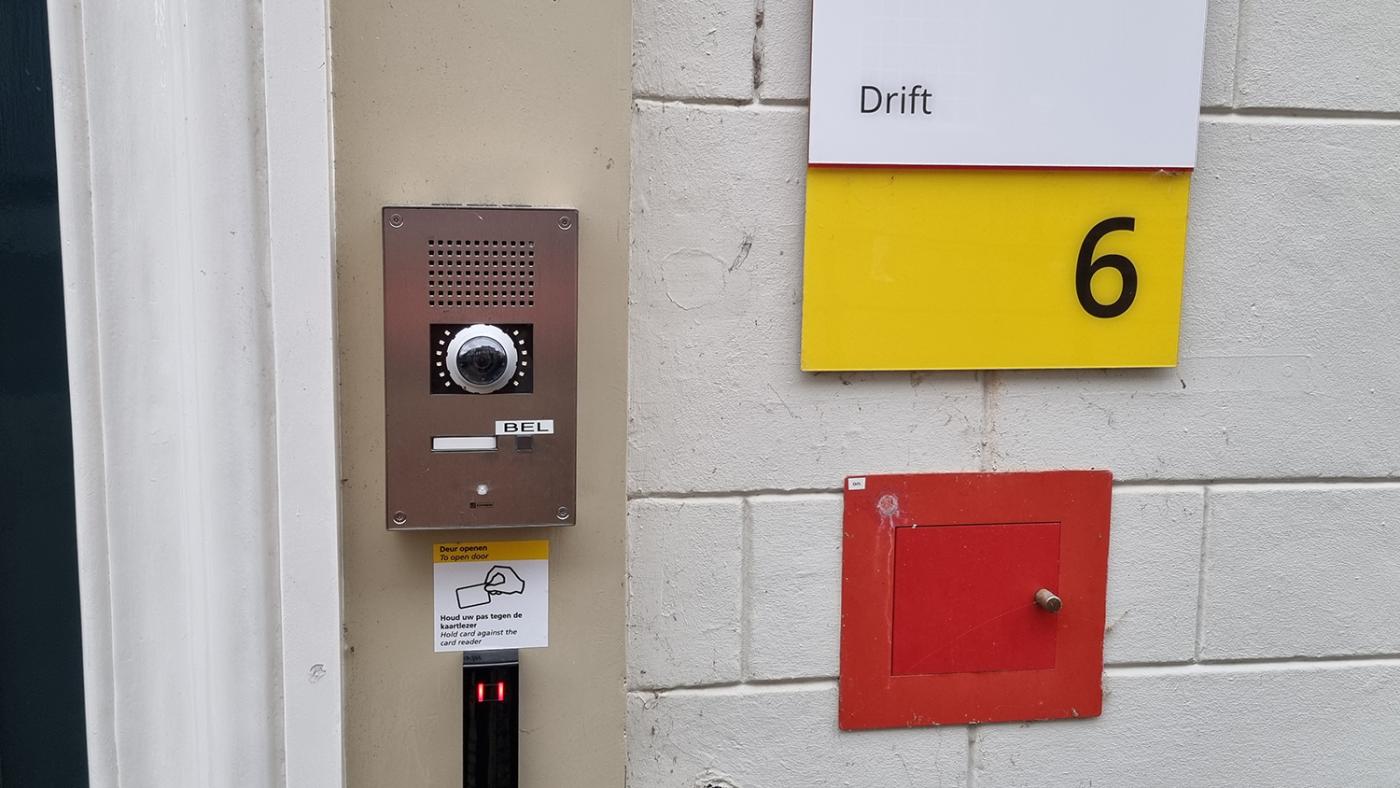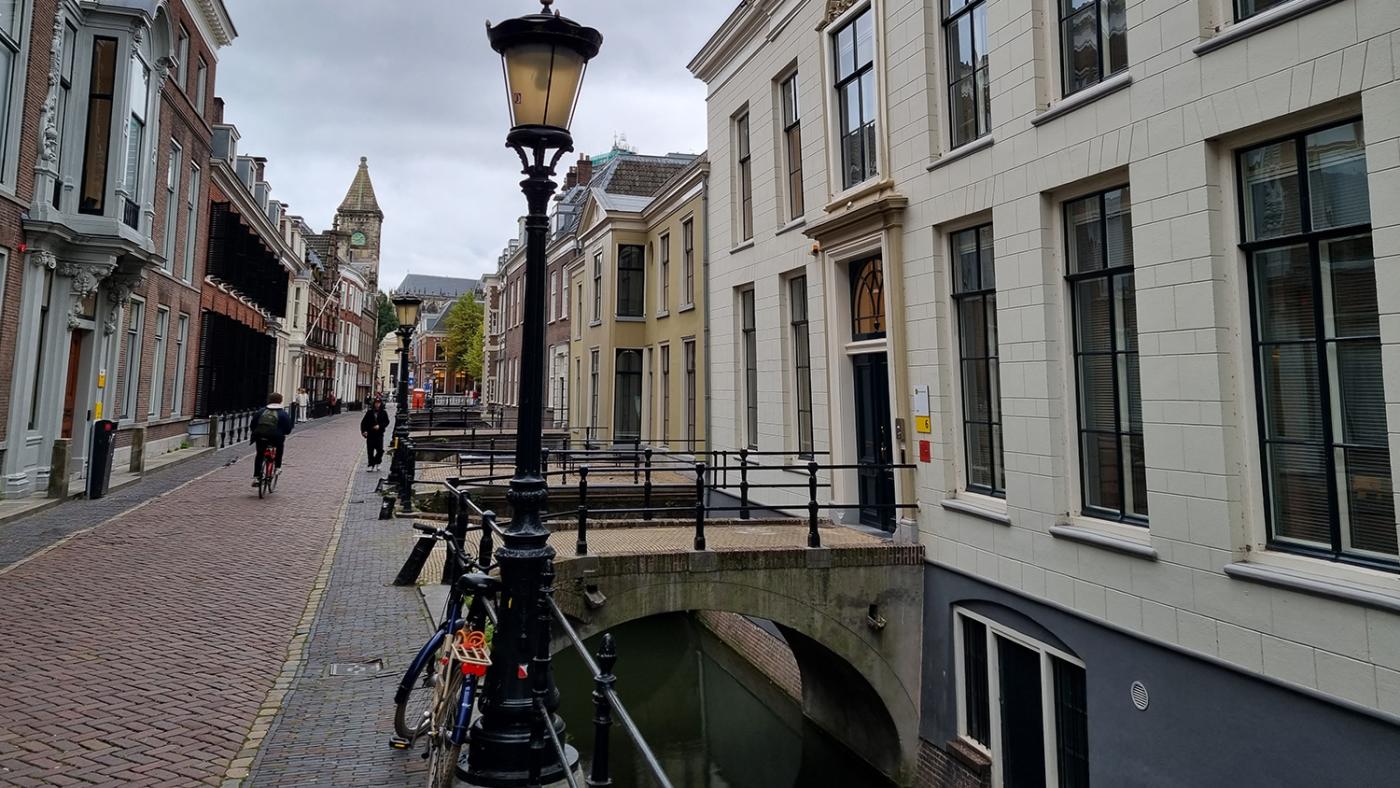Students and visitors faced with closed doors
Decision to close Drift receptions met with dissatisfaction

Department chair Jolle Demmers first hesitates to use big words but then she gives in and says: “It was... Well, love. Our receptionist, Jan, was the kind of person who could tell you who was already in the building in the morning, and who wasn’t. He always asked us how we were doing. He made things feel warm and familiar.”
Since the beginning of July, the buildings at Drift 4 and 6, which house UU's History programmes, no longer have a receptionist. The discontent about this decision is widespread. Apart from the highly appreciated social factor and the convenience of having a place to ask questions, lecturers and study advisors feel that the building has become less welcoming to guests. Welcoming visiting students and other visitors is often a complex logistical operation.
Unprofessional
Assistant Professor Jorrit Steehouder feels like he’s working in a “closed bastion”. Students and visitors have to ring a bell outside that’s connected to the reception desk of the library across the road. Someone manning that desk will then have to open the door. Needless to say, that process doesn’t always go smoothly. Once inside, there’s another set of doors that are usually closed. And then there are the hallways and offices, which are only accessible to those with a UU card.
“A while ago, I scheduled a lot of short conversations with students in a row. You can imagine the misery it was. The front door used to be open and a receptionist would help someone find their way around the building. But now many people don’t know where to go. Isn’t that unprofessional? What, exactly, do we want to portray as a university?”
Different approach
Previously, many other buildings across the university also had to see the familiar faces by the door disappear. Six years ago, the decision to do away with the reception of the Buys Ballot building was met with fierce resistance. Two years ago, UU announced that another eight reception desks were going to close, and the one at Drift was one of them.
Throughout the past few years, concerns have been repeatedly raised in this regard in the faculty councils. However, according to the Facilities Service Centre, the instance responsible for security and services inside all university buildings, the decision to close the reception desks in the Drift buildings fits with the new approach, which assumes that there will be ambulant staff maintaining surveillance throughout the building, which would safeguard students’ and employees’ safety better. The quality of the service is also to improve by combining outages, complaints and requests, and letting them be taken care of by fewer reception desks. Closing the reception desks is not a matter of cutbacks, argues UU, but rather an attempt at improvement.
Bureaucratic rule
Assistant Professor Jorrit Steehouder wonders whether the people behind the policy truly know what happens at the offices. “If this policy leads to the Drift buildings becoming less accessible for students, that surely cannot be called an improvement?”
Steehouder finds that the new policy damages social cohesion and the open character of the academic community. “I find that reprehensible, especially post-Covid. If we want people to come back to work and to their studies, we need to offer a pleasant work environment.”
For History students wishing to visit the Drift buildings, the new situation is anything but pleasant indeed, confirms Biko Kuper, internal commissioner for the study association UHSK. “It’s simply become harder to meet up with a study advisor or lecturer. As an association, we and the staff try our best to make students and teachers meet up as much as possible. A decision like this, which is bureaucratic in our view, really harms that.”
Security layers
Department head Jolle Demmers considers the complaints and concerns well-founded. She's recently met with seven job applicants and she had to ask a co-worker to come in for an additional day "just to keep an eye out for when the candidates arrived.”
In addition, it's been decided - partly due to the reduced accessibility of the buildings - that the study advisors from all departments of the faculty will hold additional consultation hours in the University Library. That way, they are easier for students to find. Demmers: “But that means they have to go to a different building, which is a shame. Many students have no idea where their lecturers work.”
Even so, Demmers prefers not to judge the policy implemented by FSC and approved by the Executive Board throughout the entire university too harshly, partially because several department employees believe it's important to have good safety measures in place. These scientists often speak out in the media about sensitive societal and political issues, a direct reason for installing multiple "security layers" in their Drift building.
“I appreciate the attention to our safety. And I do think they have communicated and worked professionally. Still, sometimes it feels like it’s a purely functional way of thinking. In the end, you know you have very little say in it, which can be frustrating sometimes.”

Satisfaction
Faculty Director Miranda Jansen is familiar with the complaints about Drift. She’s heard similar complaints before, from buildings at Trans and Mustraat (the latter to a lesser degree), when their reception desks closed last year.
Jansen previously told DUB that she was “not entirely happy” about the policy tFSC had in mind for the whole university. “It’s always nicer to greet a face at the door,” she says now.
But if it were up to her, the discussion would be closed by now. Overall, she's happy that most of the logistical issues she predicted back when the reception desks were closed have been handled adequately. She says she's satisfied with the collaboration with FSC.
“One of the issues we've encountered at Drift 4 and 6 is that the reception desk at the Library is sometimes very busy, so it can’t keep an eye on the video connection with those buildings’ bells. They’re working on that now.”
Getting used to it
When asked about the data to prove it, Deputy Director Ceel Roozeboom, from the FSC, admits there isn't much of it. But he is convinced the new approach will lead to improved security in the buildings, as well as to better service for employees and staff.
“Every time a reception desk closes, both the employees in the building and the FSC staff have to get used to the new situation. The same is true for the Drift buildings now. The complaints usually disappear once people have gotten used to it and appropriate agreements have been made. That requires good communication and perhaps a few adjustments but, in our opinion, things are steadily improving. Even at Drift. But, of course, we’re open to suggestions on how to improve.”
Less appreciated
For many staff members, however, it remains unclear why logistical issues had to be created in the first place. Besides, the complaints concern the cohesion of the academic community and the provision of a welcoming ambience for visitors.
New council member Frank van der Salm would like to study if this topic can be put on the University Council's agenda this year. In his view, the way the university employs its desk and service staff should be re-examined. He argues that the university has been ditching personal contact in favour of “a procedural approach in which standardisation is key” more and more often. “In my opinion, this has strongly diminished social safety, as well as the useful deployment and appreciation of these highly esteemed colleagues.”
FSC deputy director Roozeboom empathises with these types of messages but doesn’t believe that the new approach actually causes such negative consequences. “We try to let surveillance staff, facility staff, and cleaners work in the same buildings as much as possible, to make them more recognisable and make sure they stay in contact with lecturers and students, increasing social safety.”
Asked why there couldn’t be an approach in which the familiar receptionists stayed on, Roozeboom replies: “We studied how we could keep working as effectively and efficiently as possible, without making ourselves vulnerable if people left their post for whatever reason. We still think reception desks are important in many locations, but not everywhere. After all, it's a fact that everything we spend above our budget comes at the cost of the funds for education and research.”